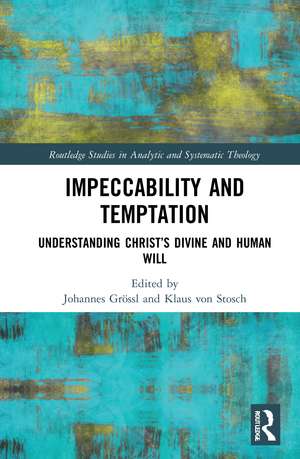Impeccability and Temptation: Understanding Christ’s Divine and Human Will: Routledge Studies in Analytic and Systematic Theology
Editat de Johannes Grössl, Klaus von Stoschen Limba Engleză Paperback – 9 ian 2023
Therefore, this volume will be of interest to scholars and graduate students working in analytic theology, biblical scholarship, systematic theology, and Christian-Islamic dialogue.
| Toate formatele și edițiile | Preț | Express |
|---|---|---|
| Paperback (1) | 370.16 lei 6-8 săpt. | |
| Taylor & Francis – 9 ian 2023 | 370.16 lei 6-8 săpt. | |
| Hardback (1) | 847.73 lei 6-8 săpt. | |
| Taylor & Francis – 13 apr 2021 | 847.73 lei 6-8 săpt. |
Preț: 370.16 lei
Nou
Puncte Express: 555
Preț estimativ în valută:
70.84€ • 73.68$ • 58.48£
70.84€ • 73.68$ • 58.48£
Carte tipărită la comandă
Livrare economică 15-29 aprilie
Preluare comenzi: 021 569.72.76
Specificații
ISBN-13: 9780367618940
ISBN-10: 036761894X
Pagini: 328
Ilustrații: 4
Dimensiuni: 156 x 234 x 22 mm
Greutate: 0.46 kg
Ediția:1
Editura: Taylor & Francis
Colecția Routledge
Seria Routledge Studies in Analytic and Systematic Theology
Locul publicării:Oxford, United Kingdom
ISBN-10: 036761894X
Pagini: 328
Ilustrații: 4
Dimensiuni: 156 x 234 x 22 mm
Greutate: 0.46 kg
Ediția:1
Editura: Taylor & Francis
Colecția Routledge
Seria Routledge Studies in Analytic and Systematic Theology
Locul publicării:Oxford, United Kingdom
Public țintă
PostgraduateCuprins
Part I Was Christ Sinless? Exegetical and Historical Approaches 1 The Sinlessness of Christ and Human Perfection 2 Sinless or Not? The Baptism by John and Jesus’ Consciousness of his Personal Sins 3 "He Himself Was Tempted" (Hebr 2:18): The Temptation of Jesus in the New Testament 4 God’s Work and Human’s Contribution: Jesus’ Sinlessness in Theodore of Mopsuestia’s Christology 5 Conciliar Christology, Impeccability, and Temptation Part II Is Christ Impeccable? Systematical Approaches 6 Seven Questions Ingredient to Jesus Christ’s Temptation 7 The Hypostatic Union and the Freedom of Christ 8 Classical Theism, Christology, and the Two Sons Worry 9 Peccable as Son of Man, Impeccable as Son of God: An Attempt to Reconcile Freedom and Impeccability 10 The Divine and Human Will of Christ 11 Deification and the Divided-Consciousness-View Part III Human Perfection and Sinlessness in Islamic Theology 12 The Scope of ‘Iṣma and Qur’anic Evidence 13 Inerrancy and Exaggeration in Shi‘I Theology 14 The Theological Concept of Imamate: How Imamis Reconcile Human Perfection and Free Will
Notă biografică
Johannes Grössl is Assistant Professor for Fundamental Theology and Comparative Studies of Religion at the University of Würzburg, Germany. He has published in Faith and Philosophy and Theology and Science and co-edited a volume of German translations of essays on divine foreknowledge and human freedom, Göttliche Allwissenheit und Menschliche Freiheit, 2015.
Klaus von Stosch is Professor for Systematic Theology at te University of Paderborn, Germany. He is an internationally well-known expert in comparative theology, having published 11 monographs and 40 edited books, among them, together with Francis Clooney, How to do Comparative Theology? He has held guest professorships in Jerusalem and research fellowships at the University of Qom (Iran), Harvard Divinity School, and Georgetown University.
Klaus von Stosch is Professor for Systematic Theology at te University of Paderborn, Germany. He is an internationally well-known expert in comparative theology, having published 11 monographs and 40 edited books, among them, together with Francis Clooney, How to do Comparative Theology? He has held guest professorships in Jerusalem and research fellowships at the University of Qom (Iran), Harvard Divinity School, and Georgetown University.
Descriere
In Christian theology, the teaching that Christ possessed both a human and divine will is central to the doctrine of two natures, but it also represents a logical paradox, raising questions about how a person can be both impeccable and subject to temptation. This volume explores these questions through an analytic theology approach.









